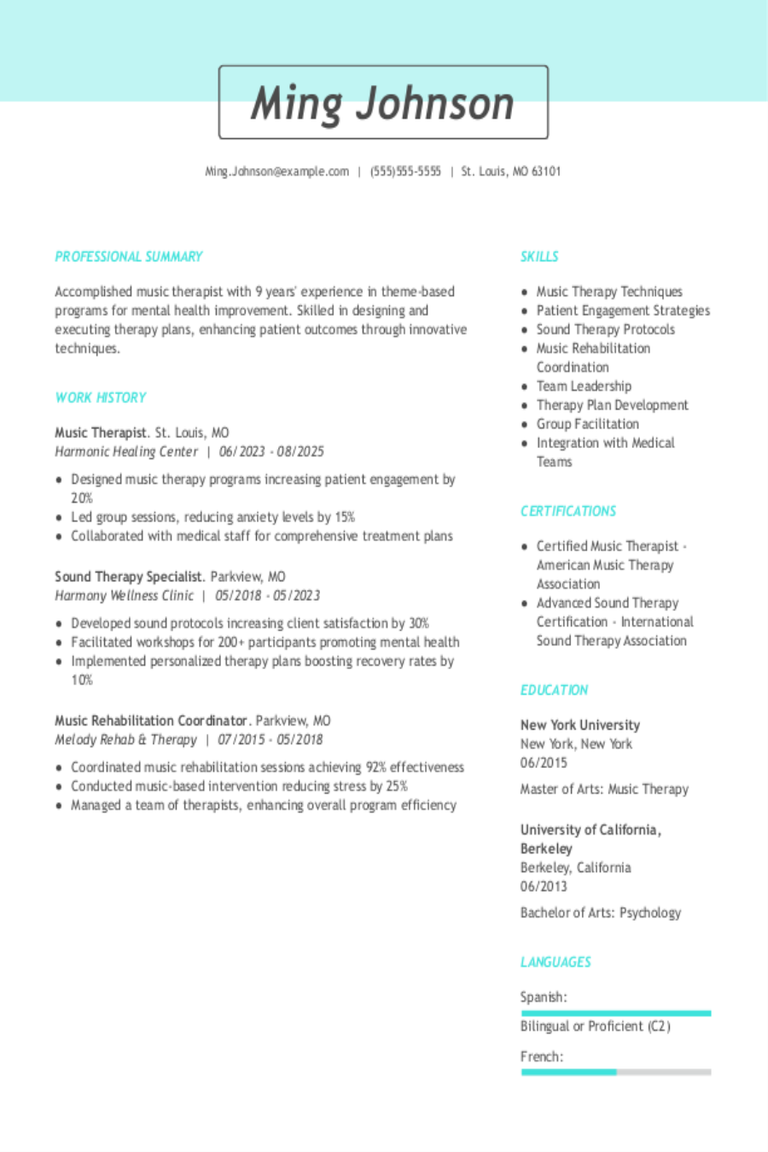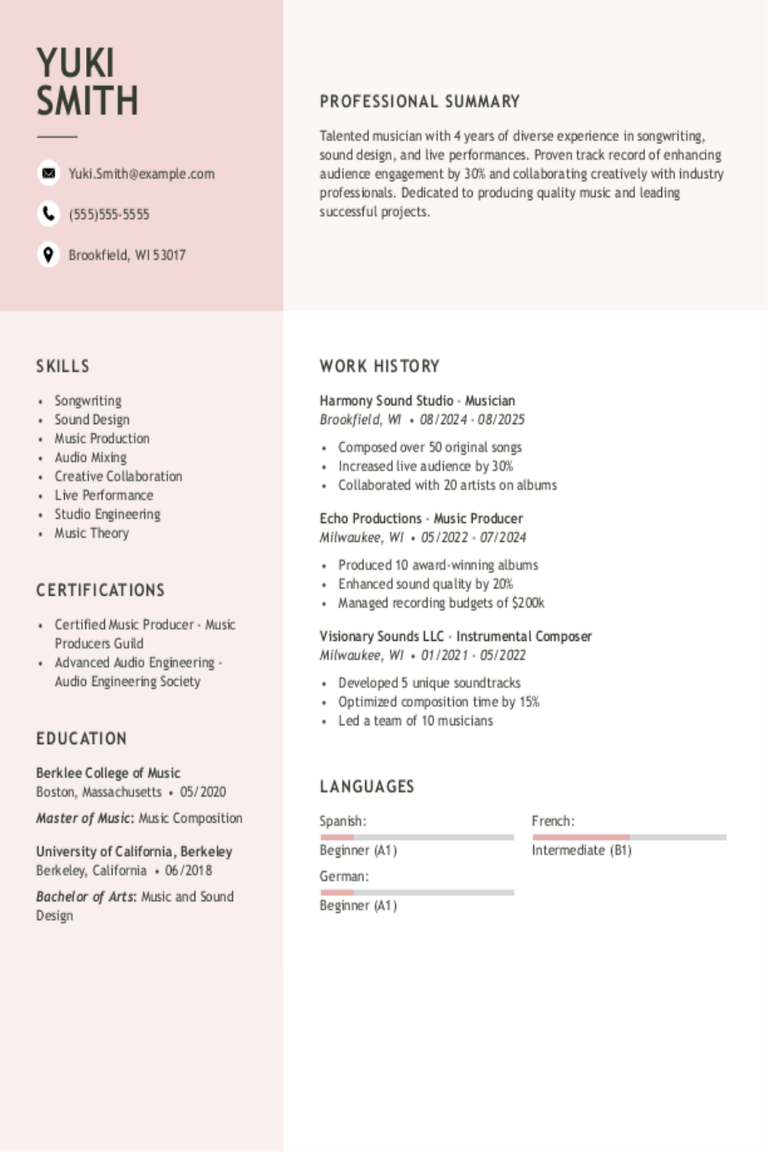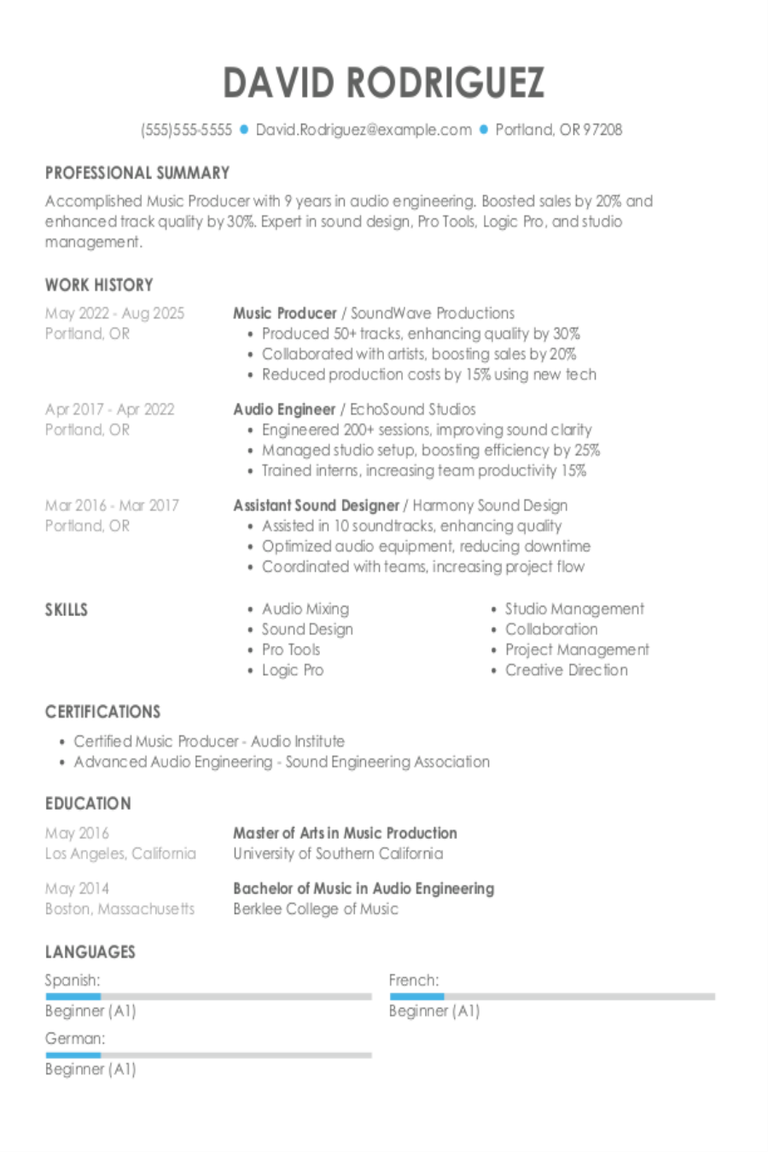Table of Contents
Get started with MyPerfectResume today!
- Build a resume on any device
- Pick an ATS-friendly template
- Tailor with AI copy suggestions
Why this resume works
- Quantifies accomplishments: Measurable accomplishments like increasing audience size by 15% and boosting ticket sales by 25% highlight the applicant’s impact and value.
- Showcases career progression: Moving from music teacher to band manager and then music director, the applicant showcases a clear trajectory of growing responsibility and expertise over time.
- Illustrates problem-solving ability: Implementing marketing strategies that boosted ticket sales by 25% demonstrates innovative problem-solving skills abd initiative.
More Music Resume Examples
Our music resume examples showcase how to emphasize your creativity, performance experience, and teamwork skills. Use these samples to design a resume that highlights your strengths and positions you as an asset in music roles.
Entry-Level Music Resume
Why this resume works
- Centers on academic background: Highlighting relevant degrees from Juilliard and NYU, the applicant’s education section paints a vivid picture of academic excellence, laying a strong foundation for their teaching career.
- Puts skills at the forefront: The resume strategically uses a skills-based resume format, spotlighting important abilities like curriculum development and performance coaching essential for entry-level roles.
- Shows digital literacy: Incorporating computer skills into music education tasks shows readiness for tech-driven teaching environments.
Mid-Level Music Resume
Why this resume works
- Demonstrates language abilities: Language skills in Spanish, French, and Italian indicate effective cross-cultural communication, improving international collaborations within music ensembles.
- Points to measurable outcomes: Increasing concert attendance by 40% highlights significant audience engagement, demonstrating the applicant’s ability to drive impactful outcomes through strategic orchestral planning.
- Includes a mix of soft and hard skills: A mix of technical prowess in orchestral planning and strong interpersonal skills showcases a balanced skill set essential for leading diverse music groups.
Experienced Music Resume
Why this resume works
- Showcases impressive accomplishments: The applicant increased audience engagement by 45% and boosted sales through a rebranding campaign, demonstrating senior-level performance.
- Focuses on work history: Using a chronological resume format, the applicant’s career progression from art manager to artistic director highlights extensive experience in creative leadership across major cities.
- Emphasizes leadership skills: The applicant exemplifies leadership skills by managing large teams and directing successful campaigns that significantly impact audience engagement and client satisfaction.
Music Resume Template (Text Version)
Chris Lee
Brookfield, WI 53010
(555)555-5555
Chris.Lee@example.com
Professional Summary
Accomplished music director with 8 years of expertise in band management, music production, and event organization. Proven success in enhancing performance and growing audiences through strategic initiatives. Expert in team leadership and curriculum development.
Work History
Music Director
Harmony Sound Studio – Brookfield, WI
January 2023 – July 2025
- Directed music programs, increasing audience by 15%
- Organized and led monthly concerts with attendance of 200+
- Managed a team of 6 to produce quality musical content
Band Manager
Starlight Music Group – Brookfield, WI
January 2018 – December 2022
- Negotiated contracts resulting in a 20% revenue increase
- Coordinated logistics for nationwide tours with 30+ venues
- Implemented marketing strategies boosting ticket sales by 25%
Music Teacher
Melody High School – Milwaukee, WI
January 2015 – December 2017
- Developed curriculum enhancing student performance by 30%
- Conducted weekly music workshops for 50+ students
- Organized annual music recitals with participation of 100+
Skills
- Music production
- Band management
- Performance direction
- Event organization
- Curriculum development
- Contract negotiation
- Marketing strategies
- Team leadership
Education
Master’s Degree Music Composition
University of California, Los Angeles Los Angeles, California
December 2014
Bachelor’s Degree Music Education
California State University, Northridge Northridge, California
December 2012
Certifications
- Certified Music Producer – Music Institute of Technology
- Advanced Band Management – National Music Association
Languages
- Spanish – Beginner (A1)
- French – Beginner (A1)
- Italian – Beginner (A1)
Browse Resume Examples by Industry
- Aviation
- Banking
- Billing And Collections
- Biology
- Boating
- Business Operations
- Casino
- Chemistry
- Child Care
- Civil Engineering
- Compliance
- Computer Hardware
- Computer Software
- Construction
- Copywriting
- Cosmetology
- Costco
- Culinary
- Customer Service
- Dance
- Data Systems Administration
- Deloitte
- Dentistry
- Driving
- Education
- Electrical
- Electrical Engineering
- Energy
- Engineering
- Entertainment
- Entrepreneur
- Entry Level
- Environmental
- Environmental Science
- Event Planning
- Executive
- Fashion
- Film
- Finance
- Fitness And Nutrition
- Food Service
- Freelancing
- General Laborer
- Goldman Sachs
- Government
- Graphic Design
- Healthcare Support
- Hospitality
- Human Resources
- HVAC
- Industrial Engineering
- Information Technology
- Insurance
- Interior Design
- Inventory Management
- Janitorial
- Landscaping
- Language Services
- Law
- Law Enforcement
- Library
- Logistics
- Maintenance
- Marketing
- McKinsey
- Mechanical Engineering
- Mechanics
- Media And Communication
- Medical
- Mental Health
- Meta
- Metal Work
- Military
- Mining
- Museum
- Netflix
- Non Profit
- Nursing
- Pharmaceutical
- Photography
- Physical Therapy
- Plumbing
- Politics
- Production
- Program Manager
- Project Manager
- Psychology
- Purchasing
- Quality Control
- Real Estate
- Religion
- Retail
- Safety And Security
- Sales
- Sciences
- Shipping
- Social Services
- Special Education
- Sports
- Statistics
- Student
- Teaching
- Team Lead
- Tesla
- Training And Development
- Transportation
- Travel
- Veterinary
- Walgreens
- Walmart
- Web Development
Advice for Writing Your Music Resume
Explore our tailored tips on how to write a resume for a music position and discover how to effectively highlight your unique talents, experiences, and passion for the world of music.
Whether you’re an aspiring musician, sound engineer, or music teacher, these insights will help you craft a standout resume that resonates with the rhythm of your career goals.
Showcase your portfolio or projects
Showcasing a portfolio or projects on your resume is essential for music roles because it allows employers and collaborators to hear your work directly. In a field driven by sound and creativity, sharing recordings, compositions, or performances gives people a clear sense of your talent before an interview.
Whether you’re pursuing opportunities as a performer, composer, or sound designer, a portfolio acts as proof of your skills and artistic style. Include links to an online portfolio or personal website where your projects can be easily accessed.
Platforms like SoundCloud, YouTube, or a dedicated website are especially effective for music since they allow direct listening. Freelance gigs, academic work, live performances, and personal projects are all valuable—don’t overlook them.
When listing projects, provide the title, the context (such as client, ensemble, or venue), a short description of the purpose, and your role. Highlight outcomes, like audience reach, successful collaborations, or positive reception, to show the impact of your work.
By structuring your projects clearly, you make it simple for hiring managers or collaborators to understand your contributions while letting your music speak for itself.
Example of a projects section
Music Composition for Independent Film
Sunset Productions
March 2023 – June 2023
- Composed original scores for a romantic drama, improving emotional impact through music.
- Collaborated with the director to ensure music aligned with the film’s narrative and mood.
- Used digital audio workstations to produce high-quality soundtracks.
Live Concert Sound Design
Harmony Events
August 2022
- Designed and executed a sound setup for a large outdoor concert attended by over 5,000 people.
- Coordinated with musicians and technical crew to achieve optimal sound quality on stage.
- Managed real-time sound adjustments during performances using advanced audio equipment.
Get inspired and save time by checking out professional resume examples. These samples can help you find the best way to show off your skills and experience.
Emphasize your most relevant skills
In music-related jobs, it’s important to highlight both technical and soft skills. Technical skills may include proficiency with music production software such as Ableton Live, Pro Tools, or Logic Pro, as well as abilities like playing instruments, composing, or arranging.
These demonstrate your capability to create, record, and produce music effectively. Equally important are soft skills like creativity, communication, and collaboration.
Music often involves working with others—whether in a band, studio, or production team—so showing you can share ideas and contribute to group efforts is essential.
To showcase your strengths, include a dedicated “Skills” section that lists your technical expertise and artistic talents. Weave these skills into your work experience. Instead of simply noting “assisted in recording sessions,” you might write, “Used Pro Tools to record and mix tracks, collaborating with a five-member team to produce an EP released on Spotify.”
This approach shows not just what you can do, but how you’ve successfully applied your skills in real-world music settings.
When creating a resume for a music career, select a resume format that highlights your performance experience, musical skills, and any relevant education or training.
Choose a professional resume template
When choosing a resume template for a music job, aim for a design that reflects both creativity and professionalism. Select a layout that’s clean, structured, and easy to read.
A simple design with clear headings helps your qualifications stand out without distracting from your content, striking the right balance between artistic flair and professional polish.
It’s also important to use a format that works well with applicant tracking systems (ATS). Overly complex designs, unusual fonts, or heavy graphics can confuse these systems and prevent your resume from being read. Instead, opt for templates with standard fonts, consistent spacing, and minimal visual clutter.
By balancing creativity with clarity, you’ll present a resume that highlights your skills and accomplishments in the music field while ensuring it gets noticed by both hiring managers and automated systems. This approach helps you stand out for the right reasons and leaves a strong impression.
Build a standout resume in minutes with our easy-to-use Resume Builder. Choose a professional template, add your details, and make a strong impression on employers.
Format your resume properly
Using the right resume format is important to making your music career shine. If you have extensive experience, a chronological resume can showcase your growth and achievements effectively.
Ensure readability by maintaining clean formatting with clear headings and bullet points to guide employers through your professional journey.
5 resume formatting tips
- Use clear section headings: Structure your resume with sections like work experience, skills, and portfolio for clarity.
- Choose a consistent font: Select readable fonts like Arial or Calibri in 10-12 pt size to improve readability.
- Employ bullet points: List skills and achievements in bullet points to make the resume easy to scan.
- Keep it one page: Aim for a one-page resume unless you have extensive experience that requires more space.
- Ensure proper spacing and alignment: Maintain uniform margins and spacing to give your resume a clean, professional appearance.
Make sure your resume stands out by using the ATS Resume Checker to catch any errors and ensure it includes important keywords before you send it off.
FAQ
Do I need to include a cover letter with my music resume?
Yes, including a cover letter with your music resume can be very beneficial. It gives you the chance to express your passion for music and the specific role you’re applying for, which a resume alone may not convey.
In the creative field of music, sharing personal stories or unique experiences through a cover letter can highlight what sets you apart from other musicians.
For instance, if you’ve played in diverse venues or collaborated with notable artists, your cover letter is an excellent place to elaborate on these experiences. Personalizing your cover letter for each opportunity shows potential employers that you’re genuinely interested in their organization and understand their musical style or goals.
Using resources like cover letter examples or tools such as our Cover Letter Generator can help craft a compelling cover letter that showcases both your skills and enthusiasm for the role.
How long should a music resume be?
For a music role, your one-page resume should ideally be concise enough to highlight your key skills, relevant experiences, and achievements without overwhelming potential employers. Focus on including your musical expertise, performances, teaching experience, if applicable, and any notable collaborations or projects.
If you have extensive experience or significant accomplishments in the music industry, a two-page resume can be appropriate. Just ensure every detail is directly related to the role you’re applying for and emphasize recent and impactful contributions.
Explore our guide on how long a resume should be for more examples and tips on determining the ideal length for your career stage.
How do you write a music resume with no experience?
To create a music resume when you lack direct experience, emphasize your skills and passion for music, and include any relevant activities or projects that demonstrate your potential. Here are a few tips on writing a resume with no experience:
- Emphasize your education: Start with any formal music education you have, including degrees or courses. Mention workshops, online classes, or private lessons that demonstrate your commitment to learning.
- Include personal projects: List any personal projects, like composing songs, producing tracks, or performing at local events. Detail what you did and the skills you used, such as mixing or songwriting.
- Highlight transferable skills: If you’ve been involved in other activities like school bands, theater productions, or even public speaking, these experiences can showcase skills like teamwork, creativity, and stage presence.
- Showcase technical abilities: If you’re proficient in music software (e.g., Ableton Live, Logic Pro) or instruments (e.g., guitar, piano), make sure to mention them as they are valuable in the music industry.
Consider seeking internships or volunteering at local music venues to gain hands-on experience. These opportunities can provide practical knowledge and help expand your network.
Rate this article
Music
Share this page
Additional Resources

Music Therapist Resume Examples & Templates
Explore music therapist resume examples and tips to learn how to highlight your experience supporting clients, using music as a tool for healing, and building strong connections through creative therapy.Build

Musician Resume Examples & Templates
Explore musician resume examples to see how to showcase your talent and experience performing in different settings and connecting with audiences. These examples and tips help you highlight your creativity

Music Producer Resume Examples & Templates
Explore music producer resume examples that show how to spotlight your creativity, technical skills, and collaboration experience. Find tips to craft a resume that highlights your ability to bring music

Monster Resume Builder Review: Features, Pros, & Cons (With Examples)
If you’re on the hunt for a simple, efficient tool to create a professional resume, you’ve likely come across the Monster resume builder. Monster is one of the most recognized
Business Owner Cover Letter Examples & Templates for 2026
Discover business owner cover letter examples to understand how to start your cover letter, emphasize your most relevant experiences, and finish on a strong note that leaves a lasting impression

Vice President Cover Letter Examples & Templates for 2026
Discover vice president cover letter examples that guide you in making a powerful first impression, showcasing essential skills, and crafting a strong conclusion to elevate your application.Build my cover letterCustomize
